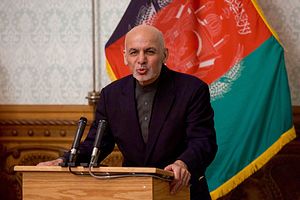President Ashraf Ghani announced a ceasefire this past Sunday, stating it would begin on Monday, August 20, if the Taliban agreed. Ghani urged the Taliban to accept the three-month-long ceasefire — the longest ceasefire offer ever made by the Afghan government to the Taliban — stating that the ceasefire was for the Afghani people and their desire for long-lasting peace.
Will the Taliban accept this new ceasefire?
While the Taliban’s spokesman Zabiullah Mujahid maintains that the group has not officially accepted or rejected the Afghan government’s offer, Monday’s violence in Kunduz seems to indicate otherwise. The Taliban confirmed the capture of three passenger buses with at least 200 people in Kunduz, including women and children, traveling for the Eid ul Adha holiday — a three-day celebration that begins on Tuesday, August 21. Afghan security forces managed to rescue 150 passengers, while 21 remain in Taliban custody. This incident, combined with the violence throughout this summer, indicates that the Taliban remain wedded to their insurgent ways.
Yet, the Taliban of today are not the same organization of the 1990s. In fact, the Taliban has redefined its mission from fighting a foreign occupation (basically targeting U.S. and NATO forces) to resisting a government that it views as a Western implant (namely, the current Ghani government and the Afghan security forces).
To show the Afghan and U.S. government, along with the Afghan people, that it has evolved, the Taliban desperately need to improve their legitimacy — and have been trying to do so for the past few years by engaging in bilateral and multilateral talks with regional players. Taliban officials have also agreed to participate in peace talks in Moscow next month. Accepting Ghani’s offer, therefore, is a low-cost way for the Taliban to increase their legitimacy. There are also three key reasons for why they should.
The first, and most obvious, reason is that the Taliban have never been stronger. According to the Special Inspector General for Afghanistan Reconstruction’s January 2018 report, approximately 54 percent of Afghanistan’s territory is under the government’s control while 30 percent remains contested — and potentially vulnerable to Taliban control. The Taliban remain openly active in at least 66 percent of Afghanistan’s territory. In May, the Taliban claimed to take control over the capital of Farah, the largest western province of Afghanistan. Even though the Taliban were unable to maintain control for long, normal life has not quite resumed in Farah’s capital, the center of the battle. Similarly, the recent battle over Ghazni, a trading hub less than a 100 miles from Kabul, highlights just how weak Afghan government forces remain to Taliban threats. The Taliban, therefore, do not need to take over urban centers to increase their strength: their successful attacks on Afghan forces are doing the trick. To agree to a ceasefire from a position of strength, therefore, works in the Taliban’s favor, where the Taliban can potentially negotiate the terms of the ceasefire while also showing a desire — and ability — to negotiate and be part of a political process.
Second, agreeing with the ceasefire may increase the chances of successful direct talks between the Taliban and the United States. Since the June ceasefire, the Trump administration has been opening up to direct talks with the Taliban. In July, and with the involvement of the Afghan government, Deputy Assistant Secretary for South and Central Asia Alice Wells met with Taliban officials in Qatar to restart peace talks. The Taliban have long desired direct talks with the United States, penning an “open letter” in February requesting a dialogue with Trump administration officials. Accepting the current ceasefire will increase the Taliban’s legitimacy as a stakeholder that wants peace in Afghanistan. Even though the American public remains largely disengaged from ongoing U.S. involvement in Afghanistan, negotiating with a stakeholder who is able to uphold a ceasefire will also make skeptical U.S. officials more likely to engage in peace talks with the Taliban.
And third, abiding by the months-long ceasefire will not only increase the Taliban’s legitimacy internationally with key regional players, but also domestically. The Taliban’s ideology and tactics remain too extreme for Afghan civilians while its dominance by Pashtuns makes non-Pashtuns of Afghanistan wary. To prove to the Afghan people that it is a legitimate political actor, and different from its past 1990s-self, the Taliban should accept Ghani’s ceasefire, and stop engaging in violent activities, such as kidnappings of civilians, killing of Afghan security forces, withdrawing protection for humanitarian organizations.
Ceasefires, however, are tricky agreements to implement. They often fail, creating more distrust and reducing the chances of peace. Yet, they are the only effective way to begin a peace process. At this point, all stakeholders in Afghanistan, which include the United States, NATO allies, Pakistan, the Afghan government, and the Taliban, know that this war can’t be “won” militarily. A political solution is necessary — and that can’t be achieved without a few successful ceasefires.
Sahar Khan is a visiting research fellow in the Defense and Foreign Policy Studies program at the Cato Institute.

































